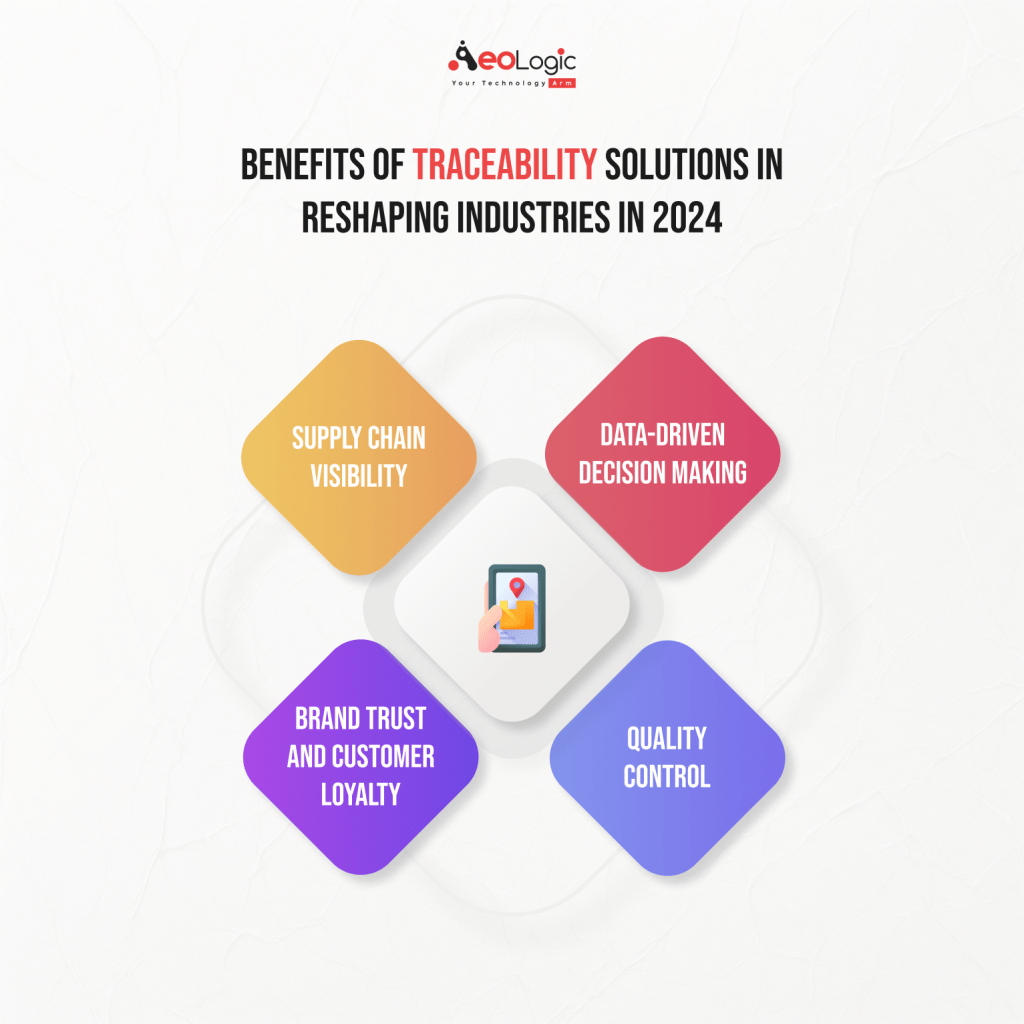There are a lot of industries present in the world that provide too many products, services, and other stuff to the people. You can say that industries are the backbone of world GDP if we look at the past stats that the global industry 4.0 market size was valued at USD 114.55 billion in 2021 and is projected to grow from USD 130.90 billion in 2022 to USD 377.30 billion by 2029, exhibiting a CAGR of 16.3% during the forecast period.
We are in 2024 and the need for people has increased more than in the last decades. Industries need to boost their productivity but enhancement in productivity can’t occur without an important factor which is traceability. Sometimes there are many defects in many processes of the manufacturing of products that result in a reduction in product overall quality and customers get the defective products. Defects are as complex and can’t be detected manually as there is a large stage of the process occurring in industries.
Traceability is a thing that can trace the whole process and find the defective phase that helps to improve the quality of products. We will see in detail how traceability-based solutions can contribute to reshaping the industries in 2024. Also, we will look at different aspects of traceability so let’s start to know about traceability.
What do Traceability and its Solutions Mean?
Generally, traceability in industries refers to the ability to trace all processes from procurement of raw materials to production, consumption, and disposal to clarify “when and where the product was produced by whom.” Overall it refers to the tracking of all processes from initial to final and provides data with the help of IOT devices such as sensors, barcode readers, etc.
The use of traceability brings transparency to the process and helps to detect errors as soon as possible. Since we talk about traceability-based solutions, Traceability solutions, or track and trace solutions, allow businesses to document data about the physical movement of parts and products, both internally and throughout the supply chain.
How Do Traceability Solutions Contribute to Industries?
In industries, proper diagnosis of the supply chain is the most important thing as the production of products passes through the different processes of the supply chain. But as we mentioned, many complex processes cause defects in the product and it’s not easy to catch defects. This is where traceability comes into play With a synchronized track-and-trace solution, as complex processes in the supply chain remain transparent and efficient. Traceability keeps a documented record of all the moving items involved, which ensures overall quality and safety. It also helps to maintain the industry-required quality standards and regulations.
Tracking is just not a thing as it has also a big impact on the global market the global track and trace solution market size was valued at USD 5.52 billion in 2022 and is projected to grow from USD 6.42 billion in 2023 to USD 20.10 billion by 2030, exhibiting a CAGR of 17.7% during 2023-2030. North America dominated the global market with a share of 35.50% in 2022.
Also Read: The Importance of Traceability in Manufacturing: An Overview
Characteristics of Traceability Solutions
Traceability solutions have a lot of characteristics as here are a few of them mentioned below.
Data Collection
Traceability solutions allow industries to collect data from every process of the supply chain that they use to improve the quality of products. Collected data also could be used to improve decision-making for the upcoming future of the industry.
Identification
Identification characteristic of traceability helps to identify the things that need to be improved in products as there could be any material that could be less, more, or missing in the products that can be in the proper amount with the use of traceability solutions.
Linking ability
Linking is a characteristic of traceability solutions that allows linking one process data to another so that results conclude based on all processes included in the whole supply chain. This ability also enables linking one system to another to track product processes.
Also Read: Role of Traceability in Sustainable Supply Chain Management
Benefits of Traceability Solutions in Reshaping Industries in 2024

There are also a lot of benefits available of traceability solutions that can help contribute to reshaping the industries in 2024. Here are some benefits mentioned below.
Supply Chain Visibility
Traceability solutions provide real-time insights into product location, storage conditions, and transportation details, optimizing logistics and improving efficiency. These insights help to improve the supply chain visibility.
Data-Driven Decision Making
Traceability solutions help in analyzing data through traceability systems allowing you to identify trends, patterns, and opportunities for improvement in supply chain operations. You can also make decisions based on proper data that provides a high chance of accurate decision-making.
Brand Trust and Customer Loyalty
Traceability solutions enable transparency between the customer and the industry as they strengthen brand loyalty by showcasing a commitment to authenticity and responsible practices. This increases customer trust in the brand and also increases loyalty towards the industry.
Quality Control
As mentioned, traceability solutions detect the defect earlier before causing too much damage to the product’s quality as by pinpointing potential issues early in the supply chain, businesses can reduce product recalls and ensure consistent quality.
Cons of Traceability Solutions that Could Be Faced while Implementing it in 2024
With a lot of advantages with traceability solutions in 2024 for industries, there are also some cons or challenges that could be faced. Here are a few general challenges mentioned below.
- The complexity of traceability solutions and the high cost of implementing traceability systems make them inapplicable for small and medium enterprises.
- The huge amount of interconnected data sometimes also becomes a concern as this sometimes causes misunderstanding of the data as it is hard to study a lot of mixed data together.
- As this is a part of technology and involves data, there is always the potential risk of losing crucial data that can be used for fraud.
Also Read our trending blog: Traceability Solutions for Supply Chains with Examples
Conclusion
Traceability solutions can be used to track the different aspects of the industries and reduce the manual or conventional methods of extracting data to detect defects. Conventional methods take a lot of time and also there is no certainty that defects could be caught. Traceability solutions maximize the accuracy that contributes to reshaping the industries in 2024.
There are some cons of traceability solutions but on the other side, it has a lot of positivity that covers up the cons side. Every industry should enable the traceability system to stay ahead of time because this is the time to bring some change to the industries. Overall, traceability is a critical aspect of product and system development that enables organizations to ensure product quality, compliance, and accountability.
Seeking to boost honesty and responsibility in your supply chain? Look to Aeologic Technologies‘ tracing solutions. Our advanced technologies are designed to track products from start to finish, checking every item’s quality and legitimacy. Using our groundbreaking tools, we boost your operational efficiency and build confidence between makers, supply folk, and shoppers.










